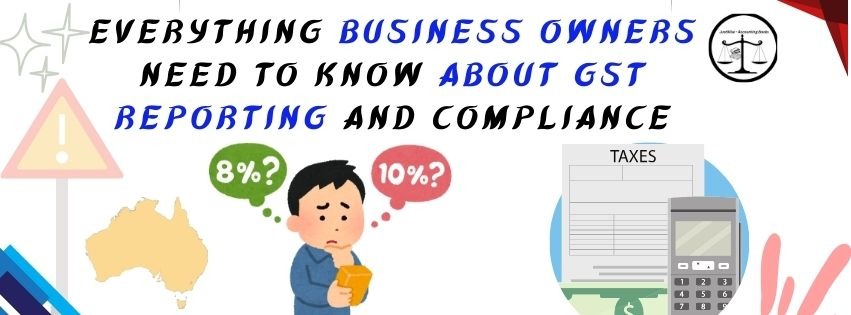A Simple Guide to GST Registration and Compliance in Australia
Justwise Accounting
3 min read


GST Basics for Business Owners in Australia
What is GST?
Goods and Services Tax (GST) is a 10% tax applied to most goods and services sold in Australia. Businesses registered for GST must collect this tax from customers and remit it to the Australian Taxation Office (ATO).
When Does a Business Need to Register for GST?
A business must register for GST if:
Its annual turnover exceeds $75,000 ($150,000 for non-profits).
It provides taxi, ride-sourcing, or chauffeur services (such as Uber or Didi), regardless of turnover.
It wants to claim fuel tax credits or engages in taxable import/export activities.
Businesses may also register voluntarily even if they don’t meet the threshold. Voluntary registration allows them to claim GST credits on expenses, which can reduce costs over time.
GST-Free and Exempt Items
Not all goods and services are subject to GST. Some are GST-free, meaning businesses do not charge GST on them. Examples include -
Basic food items such as bread, milk, vegetables, and meat.
Education and childcare services.
Medical and health services.
Financial services, including loans, insurance, and bank fees.
Residential rent.
Additionally, some items are input-taxed, meaning businesses cannot claim GST credits on them. These include financial services and residential property sales.
How GST Works for Businesses
Businesses must charge GST on taxable sales, hold the collected tax, and pay it to the ATO via a Business Activity Statement (BAS).
Understanding Input Tax vs. Input Tax Credits
Input Tax refers to purchases that do not qualify for GST credits, such as financial supplies (loans, interest, residential rent). These purchases include tax but cannot be claimed as an input tax credit.
Input Tax Credit is the credit businesses can claim on GST paid for operational expenses, reducing the GST amount payable.
Example:
If a business purchases equipment for $1,100, including $100 GST, the $100 GST paid is the input tax.
If the business is registered for GST, it can claim the $100 as an input tax credit, lowering its GST obligation.
If the purchase is input-taxed (such as financial services), no GST credit can be claimed.
What is a BAS Statement?
A Business Activity Statement (BAS) is a mandatory tax report submitted to the ATO. It includes:
GST collected from sales.
GST credits claimed on purchases.
PAYG withholding tax (if applicable).
Who Can Lodge a BAS Statement?
Business owners can lodge their own BAS.
Registered BAS agents can lodge BAS on behalf of businesses.
Bookkeepers can prepare BAS statements but must be registered or partnered with a BAS agent to lodge them legally.
The Importance of the Chart of Accounts in GST Reporting
A well-structured chart of accounts is crucial for accurate GST tracking and compliance. It ensures:
Proper classification of GST transactions, such as GST collected and GST paid.
Accurate BAS lodgement, avoiding misreporting or unnecessary tax liabilities.
Seamless integration with accounting software, minimizing errors and manual adjustments.
For example, incorrect categorization of GST-free sales as taxable could lead to an overpayment or misreporting, causing compliance issues.
GST Reporting Methods: Cash vs. Accrual Accounting
Businesses must choose between cash or accrual accounting for GST reporting:
Cash Basis: GST is reported when payments are received, which provides better cash flow management.
Accrual Basis: GST is reported when invoices are issued, even if payment has not been received, aligning with standard financial reporting practices.
How the GST Act Governs GST in Australia
The GST Act outlines GST regulations and compliance requirements, including:
Exceeding Financial Acquisition Threshold – Limits GST credits for businesses providing financial services.
90% Owned Groups – Special GST rules for businesses with shared ownership structures.
Basic Rules (Division 2) – Core GST compliance principles.
Defined Terms (Division 3) – Key GST definitions relevant to businesses.
Non-Operative Provisions (Division 4) – Guidelines for interpreting GST laws.
Final Thoughts: Why GST Matters for Business Owners
A solid understanding of GST allows business owners to:
Stay compliant with tax laws and avoid penalties.
Maximize GST credits to reduce tax liabilities.
Ensure accurate financial reporting and bookkeeping.
For assistance with BAS lodgement, GST calculations, and tax planning, consulting a registered BAS agent, Bookkeeper or accountant is recommended.
Stay in Touch
© 2025 JustWise Accounting. All rights reserved. ABN 85 581 353 385
⚠️ We respect your privacy. Unsubscribe anytime. (under subscribe button)
Serving Australia-wide
Justwise acknowledge the Traditional Owners of the lands where we operate and pay respect to Elders past and present.
